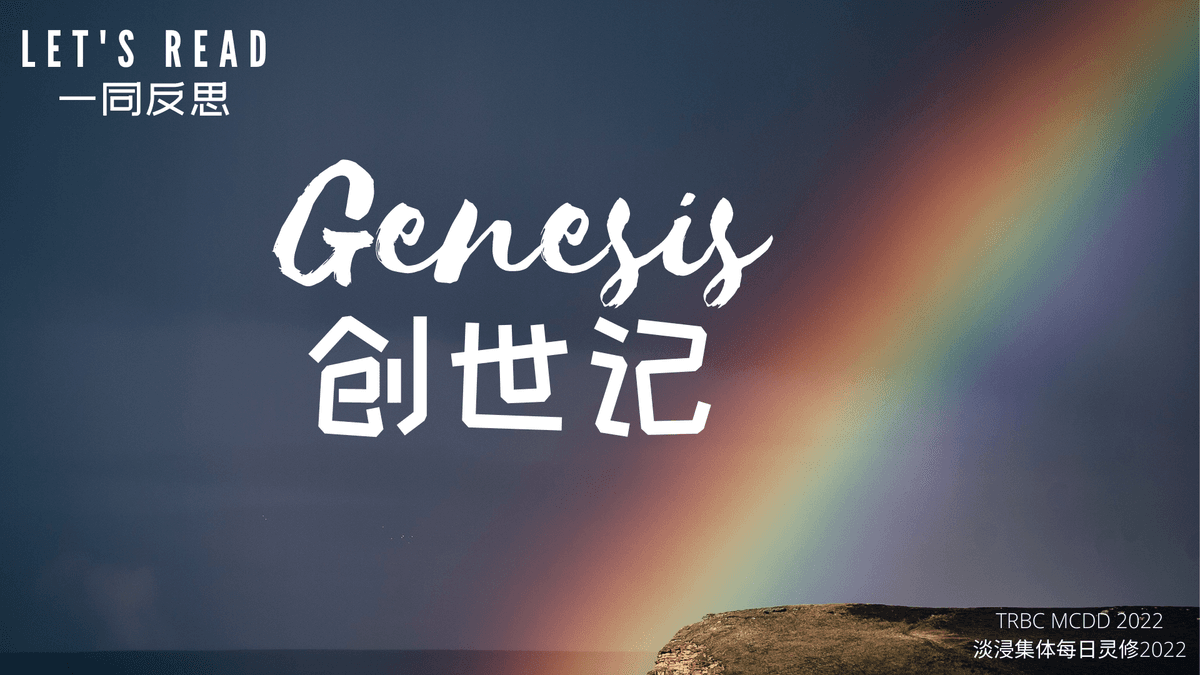Last 5 Days

Separate to Quell Strife and Support Life

1 So Abram went up from Egypt, he and his wife and all that he had, and Lot with him, into the Negeb. 2 Now Abram was very rich in livestock, in silver, and in gold. 3 And he journeyed on from the Negeb as far as Bethel to the place where his tent had been at the beginning, between Bethel and Ai, 4 to the place where he had made an altar at the first. And there Abram called upon the name of the Lord. 5 And Lot, who went with Abram, also had flocks and herds and tents, 6 so that the land could not support both of them dwelling together; for their possessions were so great that they could not dwell together, 7 and there was strife between the herdsmen of Abram's livestock and the herdsmen of Lot's livestock. At that time the Canaanites and the Perizzites were dwelling in the land.
8 Then Abram said to Lot, “Let there be no strife between you and me, and between your herdsmen and my herdsmen, for we are kinsmen. 9 Is not the whole land before you? Separate yourself from me. If you take the left hand, then I will go to the right, or if you take the right hand, then I will go to the left.” 10 And Lot lifted up his eyes and saw that the Jordan Valley was well watered everywhere like the garden of the Lord, like the land of Egypt, in the direction of Zoar. (This was before the Lord destroyed Sodom and Gomorrah.) 11 So Lot chose for himself all the Jordan Valley, and Lot journeyed east. Thus they separated from each other. 12 Abram settled in the land of Canaan, while Lot settled among the cities of the valley and moved his tent as far as Sodom. 13 Now the men of Sodom were wicked, great sinners against the Lord.
14 The Lord said to Abram, after Lot had separated from him, “Lift up your eyes and look from the place where you are, northward and southward and eastward and westward, 15 for all the land that you see I will give to you and to your offspring forever. 16 I will make your offspring as the dust of the earth, so that if one can count the dust of the earth, your offspring also can be counted. 17 Arise, walk through the length and the breadth of the land, for I will give it to you.” 18 So Abram moved his tent and came and settled by the oaks of Mamre, which are at Hebron, and there he built an altar to the Lord.
The word “Separation” evokes many connotations. Sometimes it is inevitable because it is not up to us to choose to separate. At other times it is necessary for us to be separated from others, even beneficial and healthy to do so, and we have a choice, even though it might seem uneasy or uncomfortable, and we might be reluctant to do so.
In this passage, we read about Abraham and his nephew Lot, that at first Lot was travelling with him into the Negeb. (v.1) The word Negeb or Negev means south or dry land, referring to a desert in the southern part of Israel. And because both Abraham and Lot were very rich and had great possessions and livestock, the land could not support feeding the two families and their animals. So in verse 7, we read about Abraham’s herdsmen and Lot’s herdsmen quarrelling over the land use for grazing by their animals.
In verse 9, I believe that as the uncle, Abraham graciously and generously offered Lot to choose which part of the land he wished to take. He said, “If you take the left hand, then I will go to the right, or if you take the right hand, then I will go to the left.” Naturally, the human instinct for Lot is to choose the part of land which is well-watered and has the greatest yield of crops for his herd – the Jordan Valley. It is described as a place “like the garden of the LORD” and “like the land of Egypt.” So they parted ways and Abraham settled in Canaan while Lot settled in the cities of the valley as far as the city of Sodom.
For Abraham and Lot, their separation from each other was driven by the need to keep their flocks alive, and to prevent any strife and quarrel between their herdsmen. And this initiative by Abraham was out of a good intention and motivated by a love for peaceful settlement into the land, since the land before them was wide open.
There seems to be a parenthesis (v.4 and v. 18) bracketing Abraham’s worship of the LORD in two different times of Abraham’s sojourning. Verse 4 brings us back to the first place where he had built an altar to the LORD. We read this in Genesis 12:5b-7, 5 … When they came to the land of Canaan, 6 Abram passed through the land to the place at Shechem, to the oak of Moreh. At that time the Canaanites were in the land. 7 Then the Lord appeared to Abram and said, “To your offspring I will give this land.” So he built there an altar to the Lord, who had appeared to him. And verse 18 mentions he built an altar to the Lord by the oaks of Mamre at Hebron.
In this passage, verses 14-18 interestingly tell us that it was after Lot separated from Abraham that the LORD spoke to him, to give him the important promise. This promise is in two parts: (1) The Promised Land of Canaan, as far as he could see with his eyes, to the north, south, east and west; and (2) The Promised Posterity, that his offspring will be as uncountable as the “dust of the earth.” In the Negeb (desert) the LORD used the dust to symbolize the multitude of his offspring. In another place, He used the stars of heaven and the sand by the seashore to symbolize his offspring. (Genesis 22:17)
Dear wise and loving God, You are the God of all the earth, and the God of Abraham, Isaac and Jacob. You give generously to all whom You have chosen and those who worship You with a sincere heart. Thank You for receiving and reconciling us back to Yourself to be Your children. Thank You that You multiply our posterity so that the generation of the righteous will continue to possess the land You give them. May we also remember that this world is not our home, and our true dwelling is in Your kingdom in heaven. Thank You that while we are here, You have given us all we need to testify of a mighty and loving God. May Your name be glorified in our lives, In Christ’s name. Amen!
